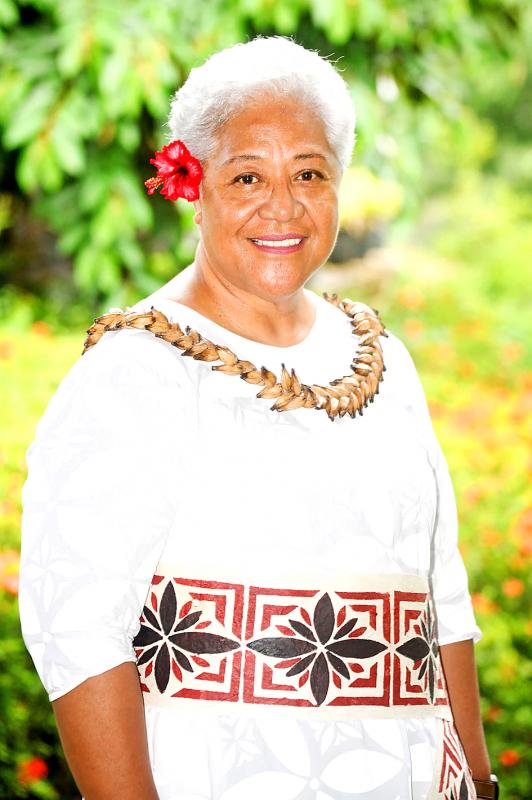More than three months after winning an election that sparked a constitutional crisis, Samoa’s first female prime minister was yesterday eventually able to take office.
A smiling Fiame Naomi Mata’afa sat in the chair her predecessor had been reluctant to relinquish after 22 years in power. She held her first Cabinet meeting, with members of her Faith in the One God of Samoa (FAST) party dressed in the distinctive red clothes that party members and supporters often wear.
Mata’afa, 64, said they were ready to begin their work.

Photo: AFP / The FAST Party Samoa
That could include a reset of the nation’s relationship with China. On the campaign trail, Mata’afa had pledged to stop a US$100 million port development backed by Beijing, calling the project excessive for a nation that is already heavily in debt to China.
After a knife-edge election result in April, Samoan Prime Minister Tuilaepa Sailele Malielegaoi refused to concede defeat, despite several court rulings that went against him.
He had two powerful allies in the nation’s head of state and the speaker, who were able to stall the transfer of power.
A bizarre scene played out in May when Mata’afa and her FAST party were locked out of the Samoan Legislative Assembly, with Malielegaoi saying he was still in charge. Mata’afa and her party members took oaths and appointed ministers in a ceremony held under a tent in front of the locked Legislative Assembly.
In an interview with The Associated Press, Mata’afa said that day was charged with emotion.
“It could have gone pear-shaped, but we were able to keep calm,” she said. “We could have stormed the building and knocked down the doors, like in Washington DC, but we just sat and sang a few hymns, sang a prayer.”
Last week, the nation’s top court ruled the unusual swearing-in ceremony that day had been constitutional, and Malielegaoi finally conceded. Mata’afa had previously served as his deputy.
She said in the interview that she resigned after becoming concerned that Malielegaoi and fellow lawmakers had gone “off the rails” by trying to politically intervene in the nation’s court system and judiciary.
“It was a classic case of power and corruption,” Mata’afa said. “We were slipping away from the rule of law, and I didn’t like that, but most of party were happy to go along with it.”
Mata’afa’s election win is seen as a milestone not only for Samoa, which is conservative and Christian, but also for the South Pacific, which has had few female leaders.
Mata’afa said she did not think her gender was a big issue in the election, and that her role in the traditional chiefly system was perhaps more important to voters, but she hoped that she might be a positive role model for Pacific women in other fields, showing what they could achieve.

Yemen’s separatist leader has vowed to keep working for an independent state in the country’s south, in his first social media post since he disappeared earlier this month after his group briefly seized swathes of territory. Aidarous al-Zubaidi’s United Arab Emirates (UAE)-backed Southern Transitional Council (STC) forces last month captured two Yemeni provinces in an offensive that was rolled back by Saudi strikes and Riyadh’s allied forces on the ground. Al-Zubaidi then disappeared after he failed to board a flight to Riyadh for talks earlier this month, with Saudi Arabia accusing him of fleeing to Abu Dhabi, while supporters insisted he was

‘SHOCK TACTIC’: The dismissal of Yang mirrors past cases such as Jang Song-thaek, Kim’s uncle, who was executed after being accused of plotting to overthrow his nephew North Korean leader Kim Jong-un has fired his vice premier, compared him to a goat and railed against “incompetent” officials, state media reported yesterday, in a rare and very public broadside against apparatchiks at the opening of a critical factory. Vice Premier Yang Sung-ho was sacked “on the spot,” the state-run Korean Central News Agency said, in a speech in which Kim attacked “irresponsible, rude and incompetent leading officials.” “Please, comrade vice premier, resign by yourself when you can do it on your own before it is too late,” Kim reportedly said. “He is ineligible for an important duty. Put simply, it was

The Chinese Embassy in Manila yesterday said it has filed a diplomatic protest against a Philippine Coast Guard spokesman over a social media post that included cartoonish images of Chinese President Xi Jinping (習近平). Philippine Coast Guard spokesman Jay Tarriela and an embassy official had been trading barbs since last week over issues concerning the disputed South China Sea. The crucial waterway, which Beijing claims historic rights to despite an international ruling that its assertion has no legal basis, has been the site of repeated clashes between Chinese and Philippine vessels. Tarriela’s Facebook post on Wednesday included a photo of him giving a

Syrian President Ahmed al-Sharaa on Sunday announced a deal with the chief of Kurdish-led forces that includes a ceasefire, after government troops advanced across Kurdish-held areas of the country’s north and east. Syrian Kurdish leader Mazloum Abdi said he had agreed to the deal to avoid a broader war. He made the decision after deadly clashes in the Syrian city of Raqa on Sunday between Kurdish-led forces and local fighters loyal to Damascus, and fighting this month between the Kurds and government forces. The agreement would also see the Kurdish administration and forces integrate into the state after months of stalled negotiations on